A year into the ongoing Israel–Hamas war the picture for chemists and other researchers in the region is bleak. And the new war that erupted last month between Israel and the Iran-backed radical Islamist group Hezbollah, based in Lebanon, has further compounded the situation.
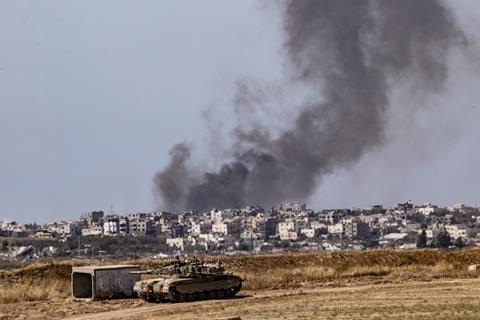
By mid-January of this year, media reports indicated that Israeli military forces had destroyed the last standing university in Gaza, which was Al Israa University. The military assault has killed almost 100 university professors in Gaza by April, according to United Nations estimates. The Hamas-run health ministry estimates that more than 41,000 in Gaza have died since the start of the war. Around 1700 Israelis have died, including those killed during last year’s 7 October attacks.
Rami Morjan, an organic and medicinal chemist at the Islamic University of Gaza, whose lab and university were destroyed early on in the war, is living in a refugee camp in Deir El-Balah. He and his family have been there since 10 November.
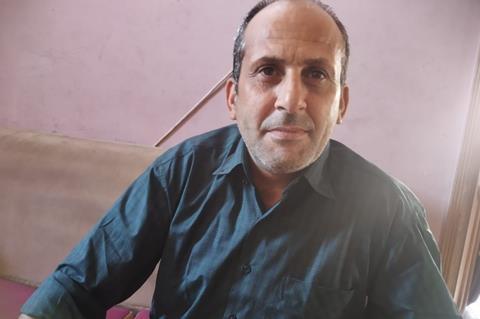
Morjan lives in a small room with his wife and four children in his brother-in-law’s old house with a tin roof that leaks whenever it rains. His father- and mother-in-law also live in the tiny house.
There is no school for his children and the family sleeps on the floor. Morjan says it’s not safe to send his children outside of their shared room, noting that his oldest sister, brother-in-law and a nephew were all killed in March during an Israeli attack at a refugee camp in Rafah – also in Gaza. He has two other sisters who remain in Gaza.
One of Morjan’s research assistants was killed, along with her family, shortly after the war started with her infant daughter the sole survivor. Morjan still remains in touch with other members of his team over WhatsApp.
‘We spend most of our time trying to secure the essential needs for life like food and water,’ Morjan states. In addition, he says there is extremely limited electricity at the camp, and so research activities are completely paralysed.
As of April 2024, the deaths of 95 professors in Gaza had been reported, according to new analysis by the Scholars at Risk (Sar) Network based in the US. This includes Sufyan Tayeh, a leading physicist in Gaza and president of the Islamic University of Gaza, who was killed in an Israeli air strike.
‘The universities have been demolished and the old data I have [that] should be published is not a priority at war time,’ says Morjan. ‘Writing scientific research requires a comfortable psychological atmosphere and a clear mind and this is not available during the war.’
Teaching chemistry
But, against all the odds, he is managing to teach five chemistry courses remotely. Although the universities in Gaza are devastated or no longer exist, Morjan says most have successfully launched online teaching.
In August, he began teaching organic chemistry, general chemistry, biochemistry for nursing, organic chemistry for health sciences students and industrial chemistry. Morjan uses lectures he pre-recorded during the Covid-19 pandemic, answers student questions via WhatsApp groups, and uses e-learning software Moodle to set homework and exams. Most of his students are also in Gaza and a few of them have managed to relocate to Egypt.
Morjan will need to record new lectures for the two new courses he’ll be teaching in October – advanced organic chemistry and chemistry of natural products. This work is made even more difficult by the fact that it is nearly impossible to keep his laptop’s battery charged given the reliance on solar energy at the refugee camp.
Currently, there is no accurate count of how many academics and researchers have left Gaza in the last year, according to Morjan. But he says most of them left for Egypt and from there some were able to go to other countries like the UK, Germany and France.
The new escalating military conflict between Israel and Hezbollah that began in September, involving Lebanon and Iran, applies additional pressure by making it even harder for international aid to enter Gaza, Morjan notes. ‘My work is paralysed since the start of the war so another war on Lebanon will just delay the [Israeli] cease-fire with Gaza, which in turn means the delay of re-starting my academic life,’ he says.
Samer Abuzerr, a water-borne diseases expert at the University College of Science and Technology in Khan Younis, Gaza, and his family are currently living in the Al-Nusairat Refugee Camp in Gaza. He says they are under the constant threat of airstrikes, facing widespread destruction and a lack of clean water on top of shortages of essential supplies.
Abuzerr says it is extremely difficult to continue his duties in current conditions. ‘The university is not operational due to damage from the conflict and with limited access to electricity, internet and other resources, both in-person and online teaching are almost impossible,’ he notes.
The war has completely halted Abuzerr’s ability to conduct any field research or teach and he says the conflict between Israel and Hezbollah has further intensified the challenges. Communication with colleagues and students is sporadic at best and research facilities are inaccessible. Access to laboratories, libraries and other facilities is also very limited.
Northern Israel under attack
The Israel–Hezbollah war has also turned things upside down for physical organic chemist Renana Poranne, a computational chemist at the Technion in Haifa, Israel. Earlier this month, in response to attacks by Israel on the organisation and its leadership, Hezbollah began launching missiles on Israeli cities, including the northern port city Haifa.
In the weeks since, there has been a steady and heavy barrage of missiles launched back and forth between Israel and Lebanon and Israel and Iran, with Haifa being a main target. Deadly drone attacks have followed as well.
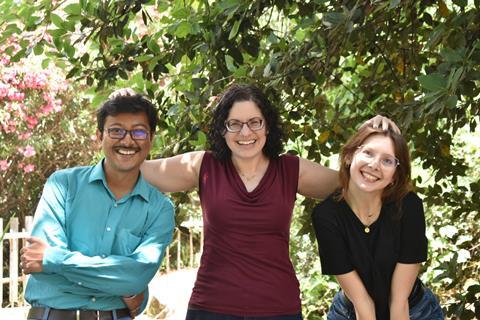
‘The situation went up in flames with the north [of Israel], and since then we’ve been having rockets fired on Haifa,’ says Poranne, who has joint Israeli-US citizenship.
One of Poranne’s students who was originally drafted into the military a year ago has just been redrafted after this latest escalation of violence. Meanwhile, her two postdocs who were evacuated by the governments of their home countries a year ago for several months – Katarzyna Młodzikowska-Pieńko from Poland and Sabyasachi Chakraborty from India – remain at the university.
On the one-year anniversary of the 7 October attack, Poranne reported hearing at least 20 rocket interceptions and each time her entire house shook, despite being located about 10km from Haifa. ‘It was … one after the other and was really scary so I told my kids, let’s go down into the safe room,’ Poranne recalls. ‘Sometimes, even after the interception, the debris … can fall and be dangerous and that is why they tell us to stay in the shelter for 10 minutes [after an attack ends],’ she explains.
Critical infrastructure at risk
Among Poranne’s concerns is the fact that the Bay of Haifa houses chemical facilities, factories, oil refineries and power plants, as well as a naval base. ‘There are chemical plants there and if something there gets hit that could be really dangerous,’ she says. ‘Also, in my town we have some petroleum stocks and if they get hit that’s terrifying,’ she adds. ‘They’re definitely targeting the Bay of Haifa.’
Several of the Hezbollah rockets launched at Israel have not been intercepted and have landed in Haifa, and some have hit buildings. But the Technion has not sustained any damage, Poranne says. She is currently working from home – meeting with her students over Zoom, reading drafts of research papers and reviewing theses, among other activities.
But some of Poranne’s students prefer to work at the Technion these days because the chemistry department has shelter rooms – made of reinforced concrete – on each of its six floors. This means that they can get there within one minute of an alert. Such safe rooms are located much further away in many of the apartments where postdocs live.
‘The main focus is keeping everybody safe,’ Poranne says. ‘Even when we’re doing science and talking about science and trying to work, it’s more for maintaining a sense of normalcy than it is for being super productive.’
At a recent faculty meeting, she recounts, many colleagues reported that some of their foreign students and postdocs have opted to return to their home countries. ‘Many of them are going to stop whatever research they’re doing and are not planning to come back,’ Poranne says. ‘It’s hard to blame anybody under these circumstances, I don’t judge anybody for making that decision … it’s not their country, it’s not their war, it’s not their problem.’
Counting one’s blessings
Poranne considers herself to be very lucky compared with many colleagues and friends – her husband and children are not drafted into the military to fight, though many cousins have been, and she does computational chemistry so can easily work remotely. ‘If the worst thing that happens to me is that I published two papers this year and not five, then I’m not complaining,’ she says.
Also, her long-standing collaborations with chemists in the US, Canada and Europe are proceeding normally and several trips overseas for conferences in recent months have gone smoothly, unlike some of her fellow Israeli researchers.
For example, a colleague from the Technion was recently giving a talk abroad, and anti-Israel protests meant the symposium had to be moved, Poranne recounts. ‘They were protesting because they had Israeli speakers,’ she says. ‘The ironic thing was that all three of their Israeli speakers were actually Arab–Israelis.’
These days, Poranne uses her US passport when travelling to Europe, whereas before she only used it for trips to the US or Canada. ‘You never know who you’re going to meet at the airport, for example, so I try to minimise any outward sign that I’m Israeli,’ she explains.
After evacuating last year after the 7 October attacks, Młodzikowska-Pieńko and Chakraborty both returned to Technion earlier this year amid reports that northern Israel was stable and the conflict with Hamas likely would end soon. But reality has played out differently.
When speaking with Chemistry World on 8 October, the two postdocs reported that just three hours earlier 85 rockets were fired at Haifa and they were hiding in a shelter in their university’s chemistry building. The Polish and Indian governments are not recommending their citizens evacuate Israel at the moment, but if that changes Młodzikowska-Pieńko and Chakraborty say they will leave.
Scrambling to help Gazan scholars
Sar is currently working to help scholars who have escaped the conflict zone by reaching out to its network members and partners and asking them to host Gazan academics.
Robert Quinn, Sar’s founding executive director, says the current situation remains ‘quite grave’, especially in Gaza where institutions have all been severely damaged or fully destroyed.
‘Until there is a mutual and lasting ceasefire it will be very difficult to deliver meaningful help inside the territory,’ Quinn tells Chemistry World. But he urges the international community and higher education sector to plan now to rebuild and repopulate the higher education sector in Gaza as soon as conditions permit.
The UK charity Council for At-Risk Academics (Cara) is also in touch with many academics in Gaza. ‘At the moment, we can’t do much for those still there, as they can’t get out now,’ states Cara’s executive director Stephen Wordsworth. He says the organisation is working with others who managed leave Gaza earlier to try to find them places to continue their academic work, where their families will also be safe.





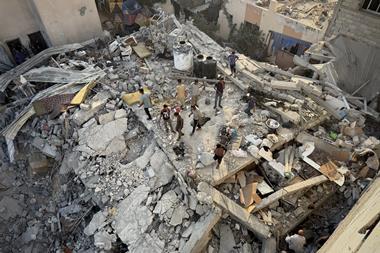
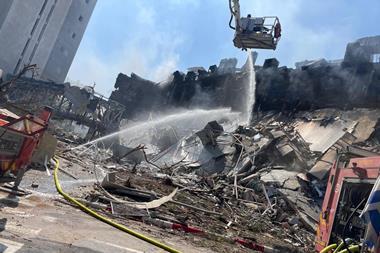
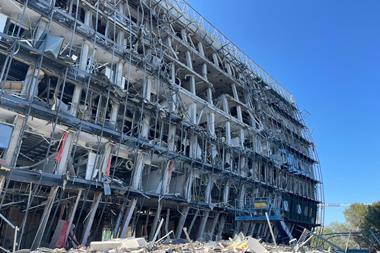
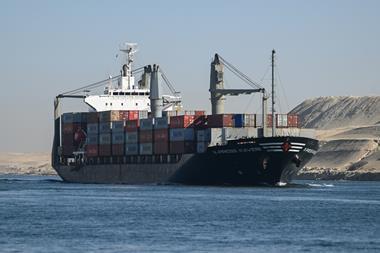
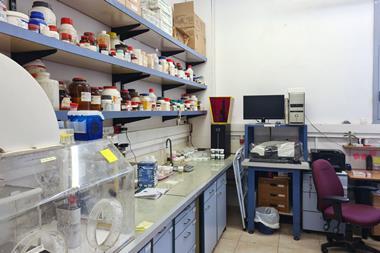
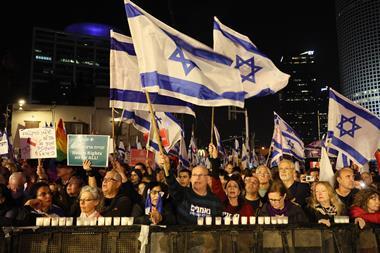






No comments yet